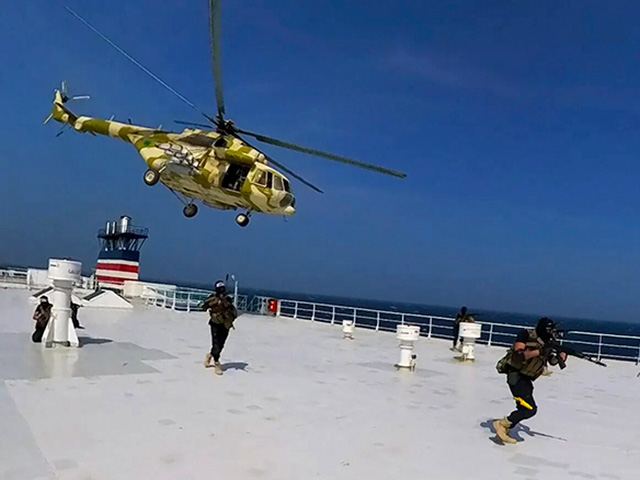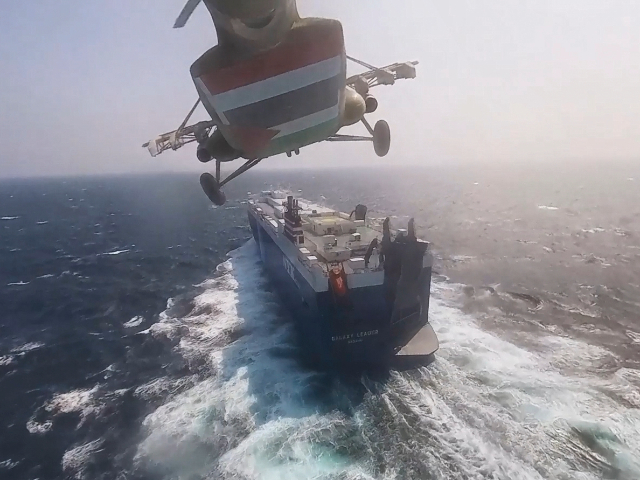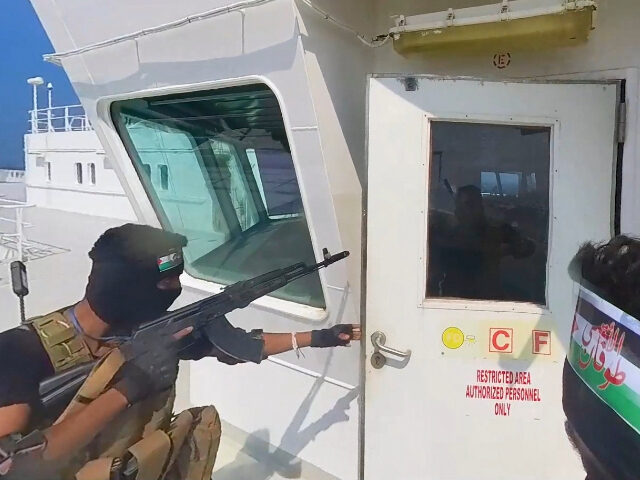The U.N. Security Council (UNSC) on Wednesday held an emergency meeting to discuss missile, drone, and boarding attacks on Red Sea shipping by the Iran-backed Houthi insurgents of Yemen.
Several members called on the Houthis to halt their attacks and release a cargo ship they hijacked in November, but the U.N. issued no formal statement and took no concrete action against the terrorists or their patrons in Iran.
Middle East: The risk of regional spillover from Gaza conflict remains high, @UNDPPA's @khiari_khaled says as Security Council meets over the continuing attacks by Houthi rebels in the Red Sea.https://t.co/xAGEiPLKo4 pic.twitter.com/FLEHl5TipS
— United Nations (@UN) January 4, 2024
U.S. Deputy Ambassador Chris Lu told the first UNSC meeting of 2024 that it should stand united against Houthi piracy and take urgent action to halt the attacks. He reminded other members that the Security Council “warned the Houthis to stop these attacks” just over a month ago, but the warning was completely ignored.
“Since November 19, there have been over 20 attacks by the Houthis. On December 31, the Houthis attempted to board the Maersk Hangzhou, a container ship registered to Singapore and operated by a Danish firm,” he said.
Lu pointed out that it was not the United Nations, but the U.S. Navy that repelled the Houthi attempt to hijack Maersk Hangzhou, and fire was exchanged with the terrorists in the process.
“These attacks pose grave implications for maritime security, international shipping, and commerce. And they undermine the fragile humanitarian situation in Yemen, damaging the ability of the international community to deliver assistance to more than 21 million people in need,” he said.

This photo released by the Houthi Media Center shows Houthi forces boarding the cargo ship Galaxy Leader on Sunday, Nov. 19, 2023. Yemen’s Houthis have seized the ship in the Red Sea off the coast of Yemen after threatening to seize all vessels owned by Israeli companies. (Houthi Media Center via AP)
Lu noted that Iran has “long enabled these attacks by the Houthis,” providing financial aid and weapons to the insurgency, including weapons used by the Houthis to attack shipping.
“We also know that Iran has been deeply involved in planning operations against commercial vessels in the Red Sea,” he added.
“It is vital that the Council speak — and speak now — on the need to uphold international law, as well as navigational rights and freedoms,” he urged, apparently to no avail.
Israeli Ambassador Gilad Erdan told UNSC the Houthi attacks are “a precursor to the dark future expected for the region and the entire world if significant action is not taken against them urgently.”
“The Ayatollah regime in Iran is the only factor that connects together all the perpetrators of destruction in the Middle East,” he said, backing Lu’s point about Iranian support for the Houthis and other malevolent actors, like the Shiite militias that have been attacking U.S. and allied personnel in Iraq.
RELATED VIDEO — Wesley Clark: Biden’s Iran Stance Is Telling the Bully “Please Don’t Hit Me” and “Encouraging” Attacks:
“This is not an ‘Israeli problem,’ it is not even a ‘Middle East problem.’ This is a threat to the entire world. A complete closure of the Bab-el-Mandeb strait will cost the world economy 6 billion dollars every day,” he warned.
Erdan said it was time for UNSC to impose sanctions on the Houthis and “those who finance or arm them,” most definitely including Iran, “the radioactive Shiite elephant in the room.”
“The Houthis, terrorists who belong to one of the poorest countries in the world, would never have obtained ballistic missiles and exploding drones without Iran and would not have had the ability to locate ships without receiving intelligence from Iran in real time,” he pointed out.
France, whose ships have destroyed Houthi attack drones over the Red Sea, insisted “the Houthis and those who train and support them” should be held responsible for destabilizing the region and threatening the global economy.
French Ambassador Nicolas de Riviere said the French military will “carry out its responsibilities in the Bab Al Mandeb Strait and will continue to contribute to the safety of commercial ships in conjunction with its partners.”
RELATED VIDEO — Top House Intel. Dem: I’d “Probably” Be More Aggressive on Iran Proxies than Biden, “Hope” He Sends “Clear Message”:
British ships have repelled Houthi terrorist attacks, as well. UK Deputy Permanent Representative James Kariuki said his government would “continue to work with allies and partners to pursue all diplomatic routes to end this threat,” but “will not hesitate to take action to deter threats to freedom of navigation in the Red Sea.”
Japanese Ambassador Kazuyuki Yamazaki called on the UNSC to “take an appropriate action to deter additional threats by the Houthis and maintain international peace and security,” without specifying what that action should be.
Russia, on the other hand, stepped up for the Houthis by defending their acts of terrorism and piracy as understandable responses to Israel’s counter-terrorism operation against Hamas.
“What is happening in the Red Sea is a direct projection of the violence in Gaza, where Israel’s bloody operation has been ongoing for three months,” said Russian Ambassador Vassily Nebenzia.
Nebenzia railed against the U.S. for allegedly covering up Israeli war crimes and holding the UNSC “hostage” by threatening to veto demands for an Israeli ceasefire. He said it would be “catastrophic” to attempt “putting out the fire of the crisis in the Red Sea with gasoline, as the United States and its allies are calling us to do.”
The Russian ambassador harshly criticized the U.S.-led Operation Prosperity Guardian security operation in the Red Sea, currently the only force protecting international shipping against Houthi terrorism, as nothing more than “hot heads” in Washington playing “one more geopolitical game.”

This photo released by the Houthi Media Center shows a Houthi forces helicopter approaching the cargo ship Galaxy Leader on Sunday, Nov. 19, 2023. Yemen’s Houthis have seized the ship in the Red Sea off the coast of Yemen after threatening to seize all vessels owned by Israeli companies. (Houthi Media Center via AP)
Arsenio Dominguez, head of the International Maritime Organization (IMO), told UNSC the Houthis are by no means limiting their attacks to Israel-linked shipping, as the terrorists publicly claimed they would do.
U.N. Assistant Secretary-General Khaled Khiari said that “no cause or grievance can justify continuation of these attacks against the freedom of navigation,” but he called for “all concerned parties to avoid further escalation and de-escalate tensions,” rather than denouncing Houthi piracy or calling for action against the perpetrators.
Khiari said de-escalation was “critical” in order for Red Sea shipping to “return to its normal state and the risk of Yemen being dragged into a regional conflagration be avoided.”
The UNSC issued a statement on December 1 condemning Houthi attacks “in the strongest terms,” including the hijacking of the MV Galaxy Leader, and demanding “all such attacks and action cease immediately.” As Ambassador Lu pointed out, the Houthis increased their illegal attacks after this statement was issued.
As of Thursday morning, UNSC had not issued any additional joint statements following the emergency meeting on Wednesday.
The U.S. and 11 allied countries made their own statement on Wednesday demanding “the immediate end of these illegal attacks and release of unlawfully detained vessels and crews.”
The allied statement referenced the UNSC condemnation of Houthi attacks and warned the terrorists against committing further “illegal, unacceptable, and profoundly destabilizing” acts.
“The Houthis will bear the responsibility of the consequences should they continue to threaten lives, the global economy, and free flow of commerce in the region’s critical waterways,” the statement said.

COMMENTS
Please let us know if you're having issues with commenting.